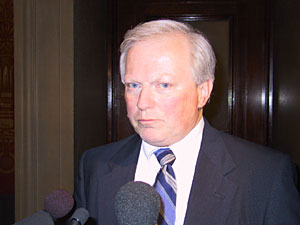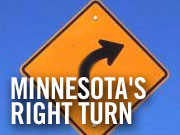|
Audio
Photos
Your Voice
|
What happened to the DFL?
August 10, 2003
 |
| Senate Majority Leader John Hottinger, DFL-St. Peter, led a divided caucus in the last session (MPR Photo/Laura McCallum) |
St. Paul, Minn. — It's harder than ever to find a Democratic face at the state Capitol. Republicans control the governor's office and hold their largest majority ever in the House. Meanwhile, the DFL majority in the Senate has dwindled to two votes.
The low point of the session for Senate Majority Leader John Hottinger, DFL-St. Peter, was conceding defeat on the budget issue. Throughout the session, Hottinger and other Democrats argued that cuts to health care, education, local government aid and other programs will erode Minnesota's quality of life.
House Speaker Steve Sviggum, R-Kenyon, traces the Democrats' failures to their message. "Their message of negativism, of the sky is falling, does not sell at all," Sviggum said. "I mean, people, by their very nature, want to be hopeful, by their very nature, they want to know that things will be better in the future than they are now."
 | |||
Democrats argue that Republicans have only one message: no new taxes. They say that's a simplistic solution to a complex budget problem. Hottinger says the difficulty for DFLers is explaining their agenda in a short soundbite.
"Democrats care about better education and better health care, they want to make sure the environment is clean, and maybe right now in this economy, most of all want to ensure that there are job opportunities and retraining for people," said Hottinger. "That took more than eight seconds."
Every member of Hottinger's caucus voted for a budget plan that raised taxes. That's more unusual than it sounds. Senate DFLers have never been of one mind, but have enjoyed large enough majorities to disguise their divisions. Not so this session. The caucus split on issues ranging from concealed carry handgun legislation to nuclear waste storage.
The deepest rift
Perhaps the deepest rift occured as the special session ended. Sen. Tom Bakk, DFL-Cook, threatened to leave the caucus, upset about a last-minute deal that reduced local government aid for Iron Range communities that receive taconite aid. Bakk said he hasn't cut all ties with the caucus, but said he doesn't plan to participate in caucus strategy meetings. He said Democrats should stop trying to appeal to suburban voters by focusing on education, and should try to pick up rural seats by talking about jobs.
"I think the Democrats have lost a lot of their base in rural Minnesota because we have, I think, in recent times, gotten too far to the left," said Bakk.
 | |||
Bakk says he'll try to push the DFL leadership more toward the middle. And that raises questions about Hottinger's security as majority leader. This was his first session in the post, which Roger Moe held for 22 years until he stepped down to make his unsuccessful run for governor.
Some rural Democrats view Hottinger, a lawyer from St. Peter, as too liberal, and there was talk of replacing him. But Sen. Dallas Sams, DFL-Staples, one of the more conservative members of the caucus, believes Hottinger is the best person to represent Democrats in the Senate. He said Hottinger is growing into his role, but needs to realize he can't appease everyone in a diverse caucus.
"I approached him a few times and said, you're the majority leader, you make the decision, and we'll abide by it, but, John, you can't please everybody," Sams said.
An "inclusive" style
Hottinger describes his leadership style as inclusive, and said he's not interested in being a dictator. He's gained the respect of lawmakers on both sides of the aisle for his even-handed manner, and said he'd like to continue as majority leader. Hottinger thinks Democrats should be able to win more seats in rural communities and in suburbs in the next couple of elections, as Minnesotans feel the effects of the Republican budget.
Hottinger's DFL counterpart in the House, Minority Leader Matt Entenza, DFL-St. Paul, says he believes Democrats can swing 15 House seats their way in 2004 and take back the majority.
"I think the huge cuts that are resulting in the loss of jobs for firefighters and police officers around the state, the fact that property taxes are going to be going up fast is going to show that the Republican policies are a disaster," said Entenza.
Entenza says Democrats' vision will focus on education, property tax relief and public safety. But as long as Democrats are outnumbered by Republicans at the Capitol, political observers say they'll continue to struggle to enact their agenda.
|
News Headlines
|
Related Subjects
|

